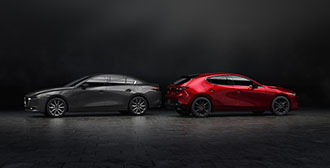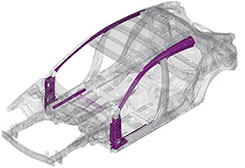NEWS RELEASES
Products and Technology
Mazda Develops World’s First Cold-Stamped Parts Using
1,310 MPa-Class High-Strength Steel
To be applied across the lineup starting from the all-new Mazda3
HIROSHIMA, Japan—Mazda Motor Corporation, working separately with Nippon Steel & Sumitomo Metal Corporation and JFE Steel Corporation, has developed the world's first cold-stamped vehicle body parts made from 1,310 MPa-class high-strength steel.1 The parts are used in Mazda's new-generation Skyactiv-Vehicle Architecture, which will underpin upcoming models starting from the all-new Mazda3.
High-strength steel enables automakers to make parts from thinner sheet metal while retaining the necessary yield strength. This results in a lighter vehicle body, which contributes to improved handling stability and fuel economy. A strong body is also essential to ensure crash safety performance, and the application of higher-strength steel has been widely anticipated.
Until now, cold-stamping of vehicle body structural members has only been possible with 1,180 MPa or lower-classed steel, due to the material's formability and the difficulty of ensuring dimensional accuracy after processing. Working in collaboration with the above-mentioned companies, however, Mazda has found an appropriate set of processing conditions that make the process possible with 1,310 MPa-class high-strength steel.
The all-new Mazda3 uses 1,310 MPa-class high-strength steel for the front pillar inner, the roof rail inner, the hinge pillar reinforcement, the roof rail reinforcement, the No. 2 crossmember and the side sill inner reinforcement, saving about 3 kilograms over the same parts in the previous model.


Mazda is working to make cars that help preserve the beauty of the earth and enrich individual lives and society as a whole by offering driving pleasure, the fundamental appeal of the automobile. Through the car-ownership experience, the company aims to become an irreplaceable presence in customers' lives and a brand with which they feel a special bond.
- 1 According to Mazda's in-house research